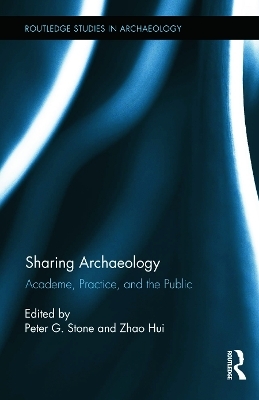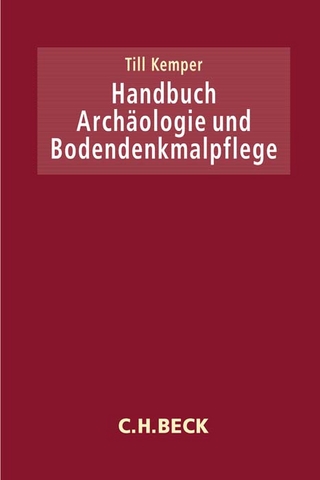
Sharing Archaeology
Routledge (Verlag)
978-0-415-74402-7 (ISBN)
Drawing on case studies from eleven countries, Sharing Archaeology explores a wide range of issues raised as the result of archaeologists’ communication both within and outside the discipline. Examining best practice with wider implications and uses beyond the specified case studies, the chapters in this book raise questions as well as answers, provoking a critical evaluation of how best to interact with varied audiences and enhance sharing of archaeology.
Peter Stone is Head of School of Arts and Cultures and Professor of Heritage Studies in the International Centre for Cultural and Heritage Studies at Newcastle University, UK. He has published widely on heritage management, interpretation and education. Peter was Honorary Chief Executive Officer of the World Archaeological Congress between 1998 and 2008. He has worked with the North East Regional Development Agency regarding the economic value of World Heritage Sites to the region; most of this economic value is based around developing sustainable tourism. In 2003 Peter was advisor to the Ministry of Defence regarding the identification and protection of the archaeological cultural heritage in Iraq. Zhao Hui is the Director of the School of Archaeology and Museology, Peking University, China. He also is the Director of the Arthur M. Sackler Museum of Art and Archaeology at Peking University. Since he gained his BA in History in 1983 and his MA in History in 1986, he has devoted himself to the research and teaching of Neolithic archaeology and field archaeology at the School of Archaeology and Museology, Peking University for more than 20 years. He has directed several national-funded and international research projects (eg.Chinese Civilization Origin Studies, Settlement Evolution and Early Civilizations, and Sino-japan cooperated Archaeobotany Research of Liangzhu Culture).
1. Sharing Archaeology: Introduction Peter Stone 2. Sharing Archaeology: An Obligation Not a Choice Peter Stone 3. Crossing Boundaries Thilo Rehren 4. Archaeology: Sharing with Whom? A Review of ‘Excavation Report of Hezhang Kele Site in 2000’ Li Ling 5. Information, Knowledge and Ideas: The Archaeological Data and Related Information-Dissemination of Knowledge Cao Bingwu 6. Cultural Heritage Management and Public Participation: Case Studies in Conservation and Renovation of Large Scale Ancient City Ruins Shan Jixiang 7. Conserving, Managing and Utilizing the World Heritage in China: A Case of Yinxu Site, Anyang City, Henan Province Jigen Tang 8. Important to Whom? How Different Communities Can Have Different Perceptions of the Value of an Archaeological Site: A Case-Study from Xi’an, China Rui Pang 9. The Workers’ and Farmers’ Archaeology of the Cultural Revolution Wang Tao 10. From Excavation to Dissemination - Breaking Down the Barriers Between Archaeology and the Public Shahina Farid 11. The MATRIX Project (Making Archaeology Teaching Relevant in the XXIst Century): An Approach to the Efficient Sharing of Professional Knowledge and Skills with a Large Audience K Anne Pyburn and George S Smith 12. The Construction of Chinese Archaeology Website and Communication in Archaeology Zhu Naicheng and Qiao Yu 13. Sharing the Past: Archaeology and Community Engagement in Southern Africa Innocent Pikirayi 14. Involving the Public in Archaeological Fieldwork: How Heritage Protection Policies Do Not Always Serve Public Interests Dominic Perring 15. How to Share Archaeological Excavation in Situ with the Public: A Case Study from Nanwang Site in Shandong Province, China Jialing Fan 16. Working with Communities to Share Cultural Knowledge Through Tourism: Principles and Practice Lyn Leader-Elliott 17. Preserving the Past, Enriching the Future: The Work of Heritage Watch in Cambodia Dougald O'reilly 18. Illicit Trafficking in Antiques and Sharing Archaeology to Combat the Trade: An Example from India Surendra Pachauri 19. Archaeology and Newspaper Reports: A Case Study of Japan Akira Matsuda 20. Performing Places Mike Pearson 21. Sharing Archaeology: Some Concluding Thoughts Mike Corbishley
| Reihe/Serie | Routledge Studies in Archaeology |
|---|---|
| Zusatzinfo | 5 Tables, black and white; 60 Halftones, black and white; 65 Illustrations, black and white |
| Verlagsort | London |
| Sprache | englisch |
| Maße | 152 x 229 mm |
| Gewicht | 544 g |
| Themenwelt | Kunst / Musik / Theater |
| Geisteswissenschaften ► Archäologie | |
| Sozialwissenschaften ► Politik / Verwaltung | |
| ISBN-10 | 0-415-74402-4 / 0415744024 |
| ISBN-13 | 978-0-415-74402-7 / 9780415744027 |
| Zustand | Neuware |
| Haben Sie eine Frage zum Produkt? |
aus dem Bereich


